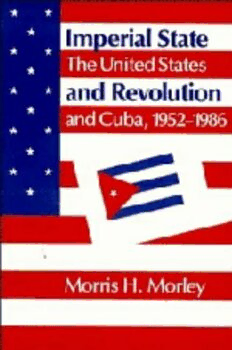
Imperial State and Revolution: The United States and Cuba, 1952–1986 PDF
582 Pages·1987·6.111 MB·English
Most books are stored in the elastic cloud where traffic is expensive. For this reason, we have a limit on daily download.
Preview Imperial State and Revolution: The United States and Cuba, 1952–1986
Description:
The United States played a decisive role in Cuba's political and economic development during the first half of the twentieth century. The emergence in the 1950s of a broad-based opposition movement to the Batista dictatorship was viewed by American policy makers as a threat to American interests. The paramount concern of the Eisenhower administration was to deny political power to the Castro forces, a goal pursued by all means short of direct military intervention. Subsequently, American policy toward Cuba, as Morris Morley shows in this book, has focused on reasserting US influence over the island. Drawing on personal interviews, classified documents obtained through the Freedom of Information Act, and other primary sources, this study presents the most comprehensive analysis to date of the Kennedy and Johnson administrations' efforts to isolate Cuba politically within Latin America and economically throughout the capitalist world. During the Nixon, Ford, and Carter presidencies, as Morley shows, the global economic blockade unraveled, as did Cuba's political pariah status in Latin America. The book also traces the responses of the US Congress and the American business community to White House policy in the 1970s. In the epilogue, Morley discusses the Reagan administration's antagonistic policies toward Havana, which recalls the policies, rhetoric, and instrumentalities displayed by Washington during the early 1960s.
See more
The list of books you might like
Most books are stored in the elastic cloud where traffic is expensive. For this reason, we have a limit on daily download.
